8A 反身代词
反身代词及其用法
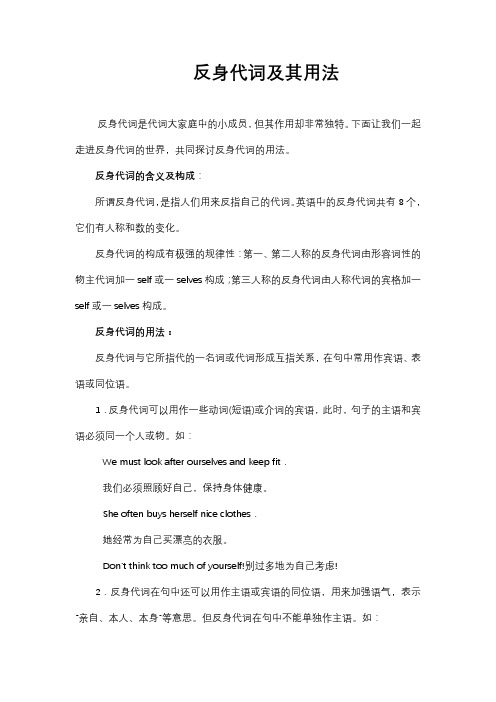
反身代词及其用法反身代词是代词大家庭中的小成员,但其作用却非常独特。
下面让我们一起走进反身代词的世界,共同探讨反身代词的用法。
反身代词的含义及构成:所谓反身代词,是指人们用来反指自己的代词。
英语中的反身代词共有8个,它们有人称和数的变化。
反身代词的构成有极强的规律性:第一、第二人称的反身代词由形容词性的物主代词加一self或一selves构成;第三人称的反身代词由人称代词的宾格加一self或一selves构成。
反身代词的用法:反身代词与它所指代的一名词或代词形成互指关系,在句中常用作宾语、表语或同位语。
1.反身代词可以用作一些动词(短语)或介词的宾语,此时,句子的主语和宾语必须同一个人或物。
如:We must look after ourselves and keep fit.我们必须照顾好自己,保持身体健康。
She often buys herself nice clothes.她经常为自己买漂亮的衣服。
Don’t think too much of yourself!别过多地为自己考虑!2.反身代词在句中还可以用作主语或宾语的同位语,用来加强语气,表示“亲自、本人、本身”等意思。
但反身代词在句中不能单独作主语。
如:I don’t need any help.I can do it myself.我不需要帮助,我自己能做。
(主语的同位语)这句话不可表示成I don’t need any help,myself can do it.If you want to know more,you may ask Miss White herself.如果你想了解更多情况,你可以问一问怀特小姐本人。
(宾语的同位语) 3.反身代词在句中还可以用作连系动词的表语。
如:The little boy in the photo was himself.照片中的那个小男孩就是他自己。
反身代词构成的固定表达:反身代词可以与一些介词、动词搭配,构成一些十分有用的固定短语。
牛津译林版8AUnit3知识点同步梳理
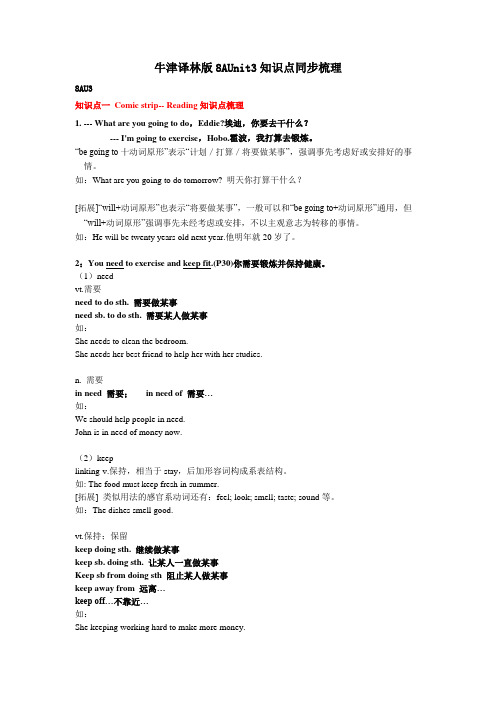
牛津译林版8AUnit3知识点同步梳理8AU3知识点一Comic strip-- Reading知识点梳理1. --- What are you going to do,Eddie?埃迪,你要去干什么?--- I'm going to exercise,Hobo.霍波,我打算去锻炼。
“be going to十动词原形”表示“计划/打算/将要做某事”,强调事先考虑好或安排好的事情。
如:What are you going to do tomorrow? 明天你打算干什么?[拓展]“will+动词原形”也表示“将要做某事”,一般可以和“be going to+动词原形”通用,但“will+动词原形”强调事先未经考虑或安排,不以主观意志为转移的事情。
如:He will be twenty years old next year.他明年就20岁了。
2:You need to exercise and keep fit.(P30)你需要锻炼并保持健康。
(1)needvt.需要need to do sth. 需要做某事need sb. to do sth. 需要某人做某事如:She needs to clean the bedroom.She needs her best friend to help her with her studies.n. 需要in need 需要;in need of 需要…如:We should help people in need.John is in need of money now.(2)keeplinking-v.保持,相当于stay,后加形容词构成系表结构。
如: The food must keep fresh in summer.[拓展] 类似用法的感官系动词还有:feel; look; smell; taste; sound等。
如:The dishes smell good.vt.保持;保留keep doing sth. 继续做某事keep sb. doing sth. 让某人一直做某事Keep sb from doing sth 阻止某人做某事keep away from 远离…keep off…不靠近…如:She keeping working hard to make more money.I’m sorry to keep you waiting for me.We should keep away from danger all the time.Please keep off the grass in the park.(3)fitadj.健康的;合适的be fit for适合…be fit for sb. to do sth.适合某人做某事如:Keeping fit is always important.She is fit for the position.vt.fit sb 适合某人The coat fits you well.3:Come on,Hobo. Let's enjoy ourselves! (P30)快点,霍波。
牛津英语8A语法

牛津8A期末语法复习与练习(一)动词不定式作宾语及宾语补足语不定式通常是由不定式符号to+ 动词原形构成。
不定式作宾语不定式作宾语有两种情况:一是及物动词后直接跟带to的不定式,二是“动词+疑问词+带to的不定式”。
⑴“动词+带to的不定式”结构:常见的以不定式作宾语的动词有afford, agree, believe,decide, fail, hope, want, plan, choose, prepare, forget, remember, begin/start, learn, promise,refuse, wish等。
如:I can’t afford to buy a house.⑵“动词+疑问代(副)词+不定式”结构:常见的这类动词有advise, decide, forget, know, learn, remember, see, tell, think, teach, wonder, understand, guess, explain等。
这类疑问代(副)词what, when, which, where, how, whether等(不包含why)。
如:She does not know how to go there.He will tell you when to start.⑶在不定式作宾语时,有时我们会使用it作形式宾语,而把不定式放到后面。
如:They consider it unnecessary to have classes in the evening不带to 的不定式1. 表示感觉的动词see, hear, feel, notice, watch, observe和have, let, make后的宾语可接不带to的不定式。
He noticed the man enter the room.他注意到有人进屋了。
They made her do the work alone.他们让她单独做这个工作。
牛津译林版英语8AUnit3Adayout知识归纳及拓展

8A Unit3 A day out 知识归纳与拓展【单词拓展】1.Australia n.澳大利亚→Australian adj.澳大利亚(人)的2.wide adj.宽的,宽广的→widely adv.广泛地,宽阔地3.boring adj.乏味的→bored adj.无聊的→bore vt.使感到厌烦4.finally adv.最后→final adj.最终的,最后的→final n.决赛,结局5.interest n.令人感兴趣的人或事;兴趣→interesting adj.有趣的→interested adj.感兴趣的6.main adj.主要的→mainly adv.主要地7.culture n.文化→cultural adj.文化的8.1uckily adv.幸好,幸运的是→lucky adj.幸运的→unlucky adj.不幸的→luck n.运气9.climber n.登山者,攀爬者→climb vt.& vi.爬10.support n.支持→support vt.支持→supporter n.支持者,拥护者11.cheer v/.& vt.欢呼,喝彩→cheer n.欢呼声,喝彩声→cheerful adj.兴高采烈的12.helpless adj.无助的→help vt.&vi.帮助→help n.帮助→helpful adj.乐于助人的13.useful adj.有用的,有益的→useless adj.无用的→use vt.用,使用→use n.用,用途14.hope n.希望→hope vt.& vi.希望→hopeful adj.有希望的→hopeless adj.没希望的15.taste n.味道;品味→taste vt.& vi.品尝→tasty adj.美味的16.colourful adj.多彩的→colour n.颜色→colour vt.为……着色【短语归纳】1.keep fit保持健康2.enjoy oneself玩得高兴,过得愉快3.make a plan for a day trip制订一日游的计划4.take a boat trip乘船旅游5.take care保重6.be made of steel由钢制成7.invite me to join their school trip邀请我参加他们的学校旅行8.arrive at the park到达公园9.can’t wait to get 0f f the bus迫不及待下车10.places of interest名胜11.from all over the world来自世界各地12.on the Internet在网上13.put them on his home page把它们放在他的主页上14.100k at each other互相对视15.keep the secret to oneself保守秘密16.get on the bus上车17.take place发生,举行18.with your support在你的支持下19.plan a day out计划外出一天20.take the underground乘地铁【句型分析】1.We’re goi ng to the top of the Eiffel Tower this afternoon!(P31)此句意为:今天下午我们就要登上埃菲尔铁塔的顶部!这是一个现在进行时态的句子,此处的are going to中的to是介词,用现在进行时表将来。
牛津译林版英语8A Unit 3 重点短语和句子

8A Unit 3单元复习一、重点短语1.climb a hill爬山2.come on来吧;赶快3.as high as a real one与真的一样高4.enjoy oneself玩得愉快5.take a boat trip乘船旅行6.having a great time玩得开心7.take care保重8.the top of……的顶部9. 90 feet wide 90英尺宽10.be made of由……制成11.do fine过的很好12. join their school trip to the World Park加入他们学校去世界公园的旅行13.on the way在路上14.a little boring有一点乏味15.a lot of traffic/ busy traffic/heavy traffic 交通繁忙16.can't wait to do sth.迫不及待地去做某事17.get off下车18.more than超过,多于19. place of interest景点20.all over the world全世界21.not believe one's eyes不相信自己的眼睛,非常惊讶22.on the Internet在网络上23.home page主页24.for yourselves为你自己,你亲自25.by oneself独立地,独自26.pull oneself up the rocks攀岩27.hurt oneself伤着某人自己28.keep the secret to themselves他们之间相互保密29.get to the final进入决赛30.take place进行,发生31.cheer for为……欢呼32.get on上车33.in the final在决赛中34. Half-time is a 20-minute period for the players to rest.半场休息是运动员休息20分钟时间。
牛津译林版8A Unit3知识点讲解
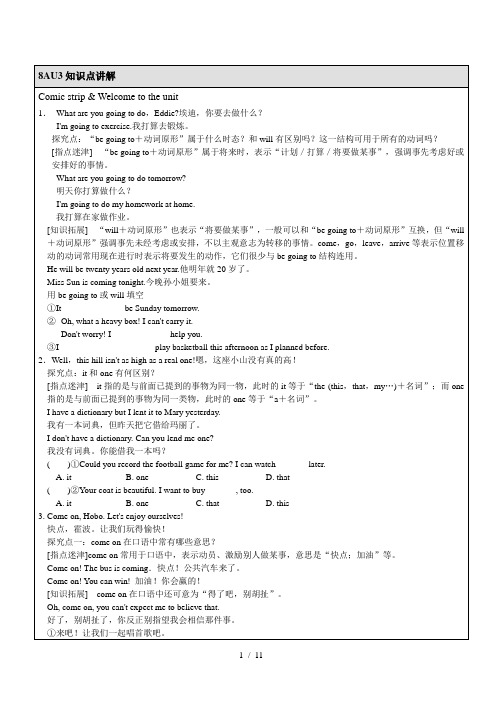
It's a fine day today.今天是一个晴朗的日子。
[知识拓展] fine用作形容词时还可指“身体好,气色好”。
He isn't fine today.今天他看上去气色不好。
①他在这儿住得不错。
He lives_____________________.
你们上个星期天坐船游览了吗?
Did you___________________________last Sunday?
5.- How wide is the bridge?这座桥多宽?
- It's 90 feet wide.90英尺宽。
探究点:长、宽、高如何表示?
[指点迷津]长、宽、高的表示方法:数词十单位词( metre,kilometre…)+long/wide/ tall。
夏季我们经常在河里游泳游得很高兴。
( )②- How was the party last night?
- We enjoyed_______very much.
A. usB. itselfC. ourselves D. myself
4. Yesterday,I took a boat trip under the famous Harbour Bridge and went past the SydneyOpera House.昨天,我乘船游览了著名的港湾大桥并且经过了悉尼歌剧院。
探究点一:invite有哪些固定搭配?
[指点迷津] invite sb. to do sth.邀请某人做某事;invite sb. to sp.邀请某人去某地。
May I invite you to go to the cinema with me?我可以邀请你和我一起去看电影吗?
8AUnit3重点讲解

8AUnit3重点讲解8A Unit3 重点讲解Welcome:1. be going to do sth. 打算做某事国庆节那天你打算做什么?我打算看⼀部电影。
What are you going to do on National Day?I’m going to see a film /movie.2. need to do sth.需要做某事need 1) 情态动词needn’t do sth. We needn’t get up early on Sunday morning.2) 实意动词need to do sth. We need to get up early on weekdays.don’t need to do sth. We don’t need to get up early on Sunday morning.need sth/ don't need sth need your help3. not as …as= not so… as不如……英语不如汉语难。
English is not as difficult as Chinese.做数学练习不如打游戏有趣。
Doing maths exercises is not as/so interesting as playing games.4. 玩得愉快enjoy oneself = have fun= have a nice/great /wonderful/lovely time (doing sth)5. take a boat trip 乘船游玩昨天我们乘船游览了太湖。
We took a boat trip on the Taihu Lake yesterday.明天天我们将乘船在那座桥下游玩。
We will take a boat trip under the bridge.6. a little coffee shop(by the River Seine)塞纳河畔的⼩咖啡馆悉尼歌剧院旁的⼀家书店a bookshop by the Sydney Opera House7. a beautiful building (with a big garden and many trees) 有个⼤花园和许多树的漂亮建筑8. How long /wide/heavy is ……?……多长/宽/重?长江有多长?6300多公⾥。
译林版牛津英语8A Unit 1单词知识点讲解
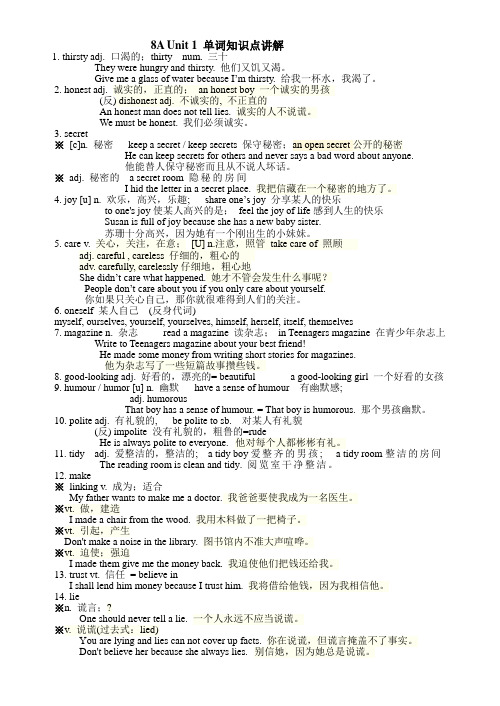
8A Unit 1 单词知识点讲解1. thirsty adj. 口渴的;thirty num. 三十They were hungry and thirsty. 他们又饥又渴。
Give me a glass of water because I’m thirsty. 给我一杯水,我渴了。
2. honest adj. 诚实的,正直的;an honest boy 一个诚实的男孩(反) dishonest adj. 不诚实的, 不正直的An honest man does not tell lies. 诚实的人不说谎。
We must be honest. 我们必须诚实。
3. secret※[c]n. 秘密keep a secret / keep secrets 保守秘密;an open secret公开的秘密He can keep secrets for others and never says a bad word about anyone.他能替人保守秘密而且从不说人坏话。
※adj. 秘密的 a secret room 隐秘的房间I hid the letter in a secret place. 我把信藏在一个秘密的地方了。
4. joy [u] n. 欢乐,高兴,乐趣; share one’s joy 分享某人的快乐to one's joy使某人高兴的是;feel the joy of life感到人生的快乐Susan is full of joy because she has a new baby sister.苏珊十分高兴,因为她有一个刚出生的小妹妹。
5. care v. 关心,关注,在意;[U] n.注意,照管take care of 照顾adj. careful , careless 仔细的,粗心的adv. carefully, carelessly仔细地,粗心地She didn’t care what happened.她才不管会发生什么事呢?People don’t care about you if you only care about yourself.你如果只关心自己,那你就很难得到人们的关注。
牛津译林版八年级上册8A英语期末复习各单元语法知识点提纲
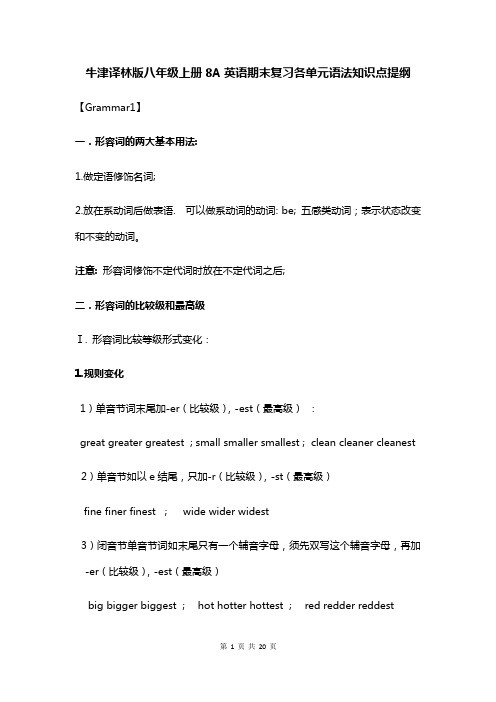
牛津译林版八年级上册8A英语期末复习各单元语法知识点提纲【Grammar1】一.形容词的两大基本用法:1.做定语修饰名词;2.放在系动词后做表语. 可以做系动词的动词: be; 五感类动词;表示状态改变和不变的动词。
注意:形容词修饰不定代词时放在不定代词之后;二.形容词的比较级和最高级Ⅰ. 形容词比较等级形式变化:1.规则变化1)单音节词末尾加-er(比较级),-est(最高级) :great greater greatest ; small smaller smallest ; clean cleaner cleanest 2)单音节如以e结尾,只加-r(比较级),-st(最高级)fine finer finest ; wide wider widest3)闭音节单音节词如末尾只有一个辅音字母,须先双写这个辅音字母,再加-er(比较级),-est(最高级)big bigger biggest ; hot hotter hottest ; red redder reddest4)以辅音字母+y结尾的词,则变y为-i,再加-er和-est。
easy easier easiest ; busy busier busiest5)部分双音节和多音节词在前面加单词more和most。
Careful more careful most carefulDifficult more difficult most difficult2.不规则变化good/well better best bad/ill worse worstmany/much more most little less leastfar farther/further farthest/furthest注:有些形容词一般没有比较等级。
如: right, wrong等。
三. 形容词比较级的用法:表示两者(人或物)的比较。
⒈表达“A大于B”用 A …比较级+than B①. Tom比我胖。
反身代词详解

反⾝代词详解反⾝代词⼀.反⾝代词表⽰某⼈⾃⼰的代词叫做反⾝代词。
它表⽰⼀个动作回到该动作执⾏者的本⾝,或者强调⾃⼰。
它有⼈称和数的变化。
反⾝代词是 oneself根据所指词的⼈称、性别、单复数等的变化可以有 myself, himself, herself, yourself, itself, ourselves, yourselves, themselves 等形式。
⼆. 构成反⾝代词⽤于指代某⼈或某物⾃⼰。
第⼀⼈称和第⼆⼈称的反⾝代词由“形容词性物主代词 + self / selves”构成;第三⼈称反⾝代词由“⼈称代词的宾格 + self / selves”构成。
见下表:第⼀⼈称第⼆⼈称第三⼈称单数myself yourself himself /herself /itself复数ourselves yourselves themselves另外:one的反⾝代词为oneself,在美国英语中也可⽤himself:One should not praise oneself [himself]. ⼀个⼈不应该⾃吹⾃擂。
三. ⽤法1. 做宾语a. 有些动词需有反⾝代词,如经常在enjoy, teach, hurt, buy, introduce, seat, dress, express, amuse, behave, absent,bathe,blame dry,cut,enjoy,hurt,introduce,behave 等。
如:We enjoyed ourselves very much last night. 我们昨晚玩得很开⼼。
He is teaching herself English.她在⾃学英语。
Please help yourself to some fish. 请你随便吃点鱼。
She could not make herself understood. 她不能使别⼈听懂她的话。
反身代词(知识点详解)中考英语专题复习

反身代词(知识点详解)中考英语专题复习1.反身代词详解:反身代词是表示反身或强调的代词,它的基本构成形式是在人称代词宾格的基础上加上-self 或-selves。
例如:myself(我自己),yourself(你自己),himself(他自己),herself(她自己),itself(它自己),ourselves(我们自己),yourselves(你们自己),themselves(他们自己)。
反身代词在人称、性别、数上需与人称代词保持一致。
2.反身代词的主要用法:用作同位语,紧放在被修饰名词后或句末,用来加强被修饰词的语气。
用作动词或介词的宾语。
在某些特殊结构中,如as...as等,反身代词可以与其他名词一起构成并列主语(且位于并列主语的后部)。
3.反身代词例句:I enjoy myself at the party.(我在聚会上玩得很开心。
)这里“myself”作为反身代词,用作动词“enjoy”的宾语,强调主语“I”自己享受聚会的乐趣。
She dressed herself.(她自己穿衣服。
)“herself”作为反身代词,用作动词“dress”的宾语,表示“她”自己完成穿衣的动作。
We should help ourselves to learn English well.(我们应该自己努力学好英语。
)这里“ourselves”作为反身代词,强调了学习的主动性和自主性,即我们应该靠自己的努力来学好英语。
They fought as bravely as they could for themselves and their country.(他们为了自己和祖国英勇战斗。
)在这个句子中,“themselves”与其他名词“they”一起构成并列主语,强调他们是为了自己的利益和国家而战斗。
【典例分析】—What can we learn from Robinson Crusoe?—We should depend on ________.A.us B.our C.ourselves【答案】C【详解】句意:——我们可以从Robinson Crusoe身上学到什么?——我们应该依靠我们自己。
江苏牛津译林8AUnit 1-4 知识点归纳
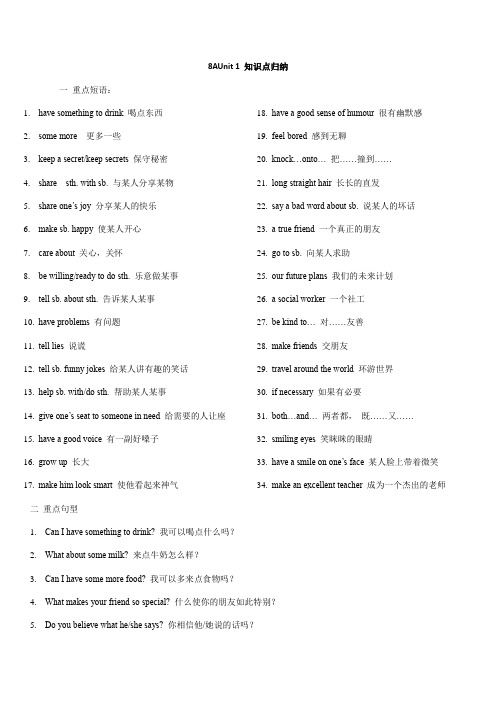
8AUnit 1 知识点归纳一重点短语:1.have something to drink 喝点东西2.some more 更多一些3.keep a secret/keep secrets 保守秘密4.share sth. with sb. 与某人分享某物5.share one’s joy 分享某人的快乐6.make sb. happy 使某人开心7.care about 关心,关怀8.be willing/ready to do sth. 乐意做某事9.tell sb. about sth. 告诉某人某事10.have problems 有问题11.tell lies 说谎12.tell sb. funny jokes 给某人讲有趣的笑话13.help sb. with/do sth. 帮助某人某事14.give one’s seat to someone in need 给需要的人让座15.have a good voice 有一副好嗓子16.grow up 长大17.make him look smart 使他看起来神气18.have a good sense of humour 很有幽默感19.feel bored 感到无聊20.knock…onto… 把……撞到……21.long straight hair 长长的直发22.say a bad word about sb. 说某人的坏话23.a true friend 一个真正的朋友24.go to sb. 向某人求助25.our future plans 我们的未来计划26.a social worker 一个社工27.be kind to… 对……友善28.make friends 交朋友29.travel around the world 环游世界30.if necessary 如果有必要31.both…and… 两者都,既……又……32.smiling eyes 笑眯眯的眼睛33.have a smile on one’s face 某人脸上带着微笑34.make an excellent teacher 成为一个杰出的老师二重点句型1.Can I have something to drink? 我可以喝点什么吗?2.What about some milk? 来点牛奶怎么样?3.Can I have some more food? 我可以多来点食物吗?4.What makes your friend so special? 什么使你的朋友如此特别?5.Do you believe what he/she says? 你相信他/她说的话吗?6.What makes good friends? 什么样的人适合做好朋友呢?7.You can trust them because they never tell lies. 你可以信任他们,因为他们从不说谎8.She is one of my best friends. 她是我最好的朋友之一。
2017 9 牛津译林英语 8A unit3 语法专题三:as…as的用法与反身代词unit3
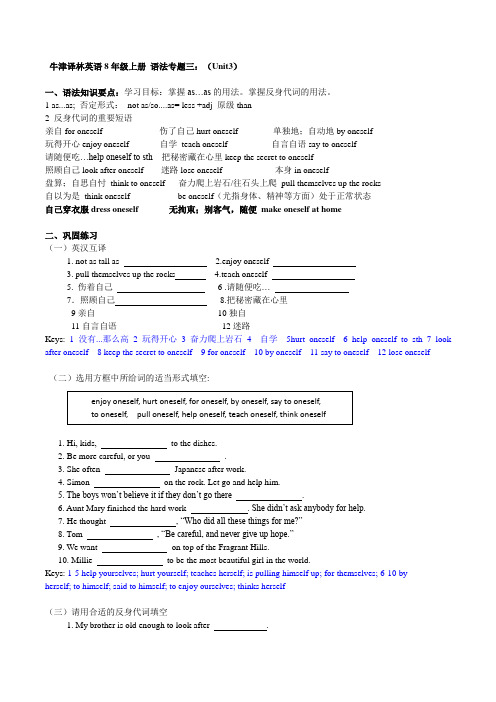
牛津译林英语8年级上册 语法专题三:(Unit3)一、语法知识要点:学习目标:掌握as…as 的用法。
掌握反身代词的用法。
1 as...as; 否定形式: not as/so....as= less +adj 原级than2 反身代词的重要短语亲自for oneself 伤了自己hurt oneself 单独地;自动地by oneself 玩得开心enjoy oneself 自学 teach oneself 自言自语say to oneself请随便吃…help oneself to sth 把秘密藏在心里keep the secret to oneself照顾自己look after oneself 迷路lose oneself 本身in oneself盘算;自思自忖 think to oneself 奋力爬上岩石/往石头上爬 pull themselves up the rocks自以为是 think oneself be oneself (尤指身体、精神等方面)处于正常状态自己穿衣服dress oneself 无拘束;别客气,随便 make oneself at home二、巩固练习(一)英汉互译1. not as tall as ________2.enjoy oneself3. pull themselves up the rocks4.teach oneself5. 伤着自己 6 .请随便吃…7.照顾自己 8.把秘密藏在心里____________9亲自__________ 10独自___________11自言自语____________ 12迷路 _____________Keys: 1 没有...那么高 2 玩得开心 3 奋力爬上岩石 4 自学 5hurt oneself 6 help oneself to sth 7 look after oneself 8 keep the secret to oneself 9 for oneself 10 by oneself 11 say to oneself 12 lose oneself(二)选用方框中所给词的适当形式填空:1. Hi, kids, to the dishes.2. Be more careful, or you .3. She often Japanese after work.4. Simon on the rock. Let go and help him.5. The boys won’t believe it if they don’t go there .6. Aunt Mary finished the hard work . She didn’t ask anybody for help.7. He thought , “Who did all these things for me?”8. Tom , “Be careful, and never give up hope.”9. We want on top of the Fragrant Hills.10. Millie to be the most beautiful girl in the world.Keys: 1-5 help yourselves; hurt yourself; teaches herself; is pulling himself up; for themselves; 6-10 by herself; to himself; said to himself; to enjoy ourselves; thinks herself(三)请用合适的反身代词填空1. My brother is old enough to look after.2. I bought a CD as my birthday present yesterday.3. The Class 1, Grade 8 students enjoyed in the school trip.4. You shouldn’t leave your 5-year-old daughter by __________at home.5. Simon and Linda kept their secrets to .6. Help to some fish, Eddie.7. We taught how to play computer games when we were young.8. Look! The cat is pulling up the wall.9. The question is easy, and you can work it out by , boys.10. Thanks for the Internet, the world is becoming smaller and smaller.11. My mother bought a skirt for _____________ (she)12 The young boy can dress____________(he) now.13 I think the computer will restart by__________(it) in a few seconds.14 The world _________(it) is full of amazing things.15 Mr Zhang fell off the horse and hurt________(he).16 Mr Zhang fell off and the horse hurt_________(he).17 I lost ________ (I) in the beautiful music.18 I hid_________(I) behind the door.Keys: 1-5 himself; myself; themselves; herself; themselves; 6-10 yourself; ourselves; itself; yourselves; itself 11 herself 12 himself; 13 itself 14-18 itself; himself; him; myself; myself;(四) 同义句转换1. Betty learned French by herself. Betty French.2. Did you all have a good time today? Did you today?3. She decides she will go to Shanghai during the summer holiday.She go to Shanghai during the summer holiday.4. If you don’t hurry up, you won’t catch the first bus.Hurry up, you’ll the first bus.5.I wonder where Simon is hiding. I want where Simon is hiding.lie decided to go hiking alone. Millie decided to go hiking ____________.Keys: taught herself; enjoy yourself; decides to; or/miss; to know; by herself.(五)、单项选择1 --Tom, make ________ at home. Would you like something to drink?-- Thanks, Miss Wang. I’d like some tea, please.A myselfB himselfC yourselfD ourselves2 Don’t worry about me. I’m old enough to think for _______.A himselfB herselfC yourselfD myself3 Peter enjoyed ______at his birthday party last night.A heB himC himselfD his4 --I’m afraid I won’t pass the exam.-- Come on, Bill. You should believe in_______. That’s the secret of success.A myselfB ourselvesC yourselfD yourselves5 Those children can put on their coats ________.A themselvesB herselfC yourselvesD himself6 --Who taught ______English.--Nobody, I taught _______English.A your; myB you; myselfC your; myselfD you; myKeys: CDCCAB(六)用反身代词翻译句子。
反身代词讲解
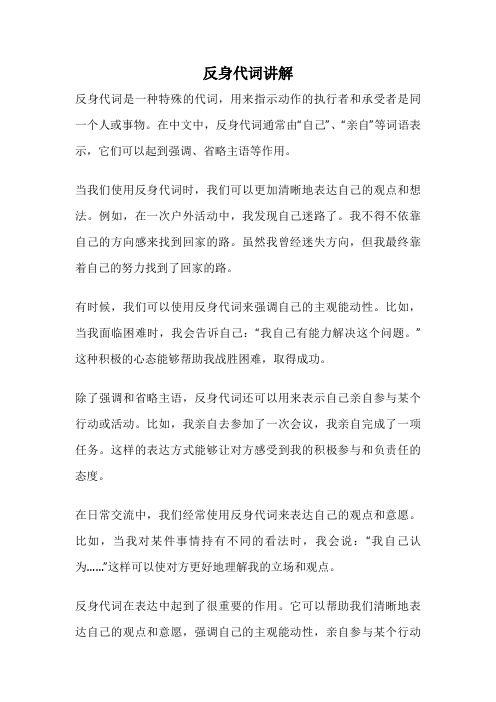
反身代词讲解
反身代词是一种特殊的代词,用来指示动作的执行者和承受者是同一个人或事物。
在中文中,反身代词通常由“自己”、“亲自”等词语表示,它们可以起到强调、省略主语等作用。
当我们使用反身代词时,我们可以更加清晰地表达自己的观点和想法。
例如,在一次户外活动中,我发现自己迷路了。
我不得不依靠自己的方向感来找到回家的路。
虽然我曾经迷失方向,但我最终靠着自己的努力找到了回家的路。
有时候,我们可以使用反身代词来强调自己的主观能动性。
比如,当我面临困难时,我会告诉自己:“我自己有能力解决这个问题。
”这种积极的心态能够帮助我战胜困难,取得成功。
除了强调和省略主语,反身代词还可以用来表示自己亲自参与某个行动或活动。
比如,我亲自去参加了一次会议,我亲自完成了一项任务。
这样的表达方式能够让对方感受到我的积极参与和负责任的态度。
在日常交流中,我们经常使用反身代词来表达自己的观点和意愿。
比如,当我对某件事情持有不同的看法时,我会说:“我自己认为……”这样可以使对方更好地理解我的立场和观点。
反身代词在表达中起到了很重要的作用。
它可以帮助我们清晰地表达自己的观点和意愿,强调自己的主观能动性,亲自参与某个行动
或活动。
因此,在日常交流中,我们应该灵活运用反身代词,使我们的表达更加准确和生动。
初中英语8A U3 知识点校对版
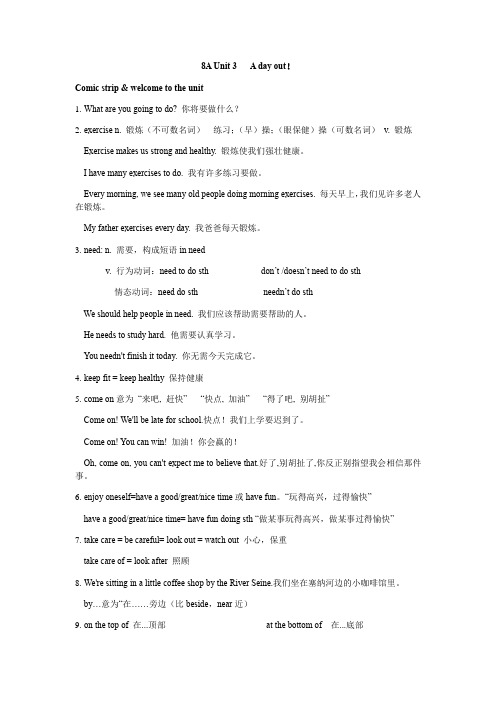
8A Unit 3 A day out!Comic strip & welcome to the unit1.What are you going to do? 你将要做什么?2.exercise n. 锻炼(不可数名词)练习;(早)操;(眼保健)操(可数名词)v. 锻炼Exercise makes us strong and healthy. 锻炼使我们强壮健康。
I have many exercises to do. 我有许多练习要做。
Every morning, we see many old people doing morning exercises. 每天早上,我们见许多老人在锻炼。
My father exercises every day. 我爸爸每天锻炼。
3.need: n. 需要,构成短语in needv. 行为动词:need to do sth don’t /doesn’t need to do sth情态动词:need do sth needn’t do sthWe should help people in need. 我们应该帮助需要帮助的人。
He needs to study hard. 他需要认真学习。
You needn't finish it today. 你无需今天完成它。
4.keep fit = keep healthy 保持健康e on意为“来吧, 赶快”“快点, 加油”“得了吧, 别胡扯”Come on! We'll be late for school.快点!我们上学要迟到了。
Come on! You can win! 加油!你会赢的!Oh, come on, you can't expect me to believe that.好了,别胡扯了,你反正别指望我会相信那件事。
6.enjoy oneself=have a good/great/nice time或have fun。
牛津译林8AU3语法原级比较和反身代词
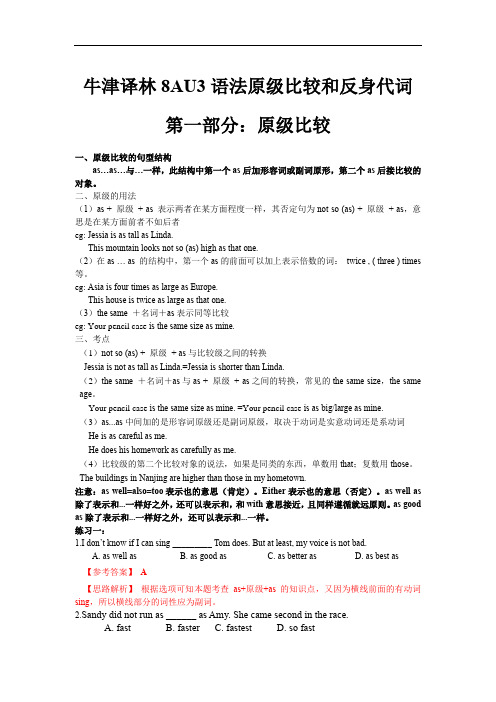
牛津译林8AU3语法原级比较和反身代词第一部分:原级比较一、原级比较的句型结构as…as…与…一样,此结构中第一个as后加形容词或副词原形,第二个as后接比较的对象。
二、原级的用法(1)as + 原级+ as 表示两者在某方面程度一样,其否定句为not so (as) + 原级+ as,意思是在某方面前者不如后者eg: Jessia is as tall as Linda.This mountain looks not so (as) high as that one.(2)在as … as 的结构中,第一个as的前面可以加上表示倍数的词:twice , ( three ) times 等。
eg: Asia is four times as large as Europe.This house is twice as large as that one.(3)the same +名词+as表示同等比较eg: Your pencil case is the same size as mine.三、考点(1)not so (as) + 原级+ as与比较级之间的转换Jessia is not as tall as Linda.=Jessia is shorter than Linda.(2)the same +名词+as与as + 原级+ as之间的转换,常见的the same size,the same age。
Your pencil case is the same size as mine. =Your pencil case is as big/large as mine.(3)as...as中间加的是形容词原级还是副词原级,取决于动词是实意动词还是系动词He is as careful as me.He does his homework as carefully as me.(4)比较级的第二个比较对象的说法,如果是同类的东西,单数用that;复数用those。
小学1~6年级所有反身代词
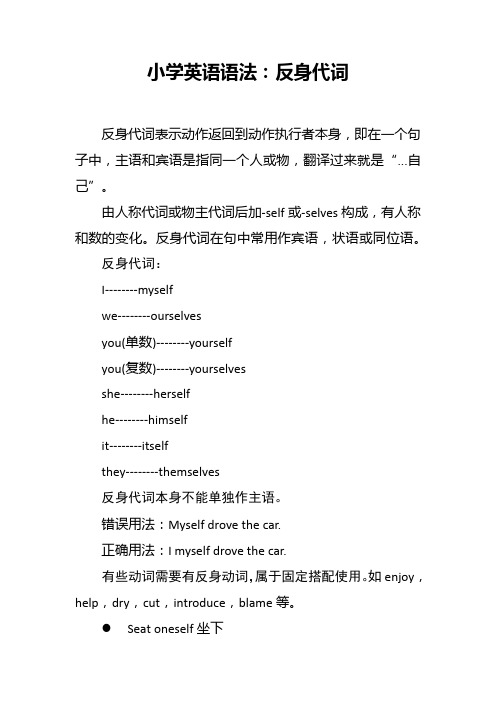
小学英语语法:反身代词反身代词表示动作返回到动作执行者本身,即在一个句子中,主语和宾语是指同一个人或物,翻译过来就是“...自己”。
由人称代词或物主代词后加-self或-selves构成,有人称和数的变化。
反身代词在句中常用作宾语,状语或同位语。
反身代词:I--------myselfwe--------ourselvesyou(单数)--------yourselfyou(复数)--------yourselvesshe--------herselfhe--------himselfit--------itselfthey--------themselves反身代词本身不能单独作主语。
错误用法:Myself drove the car.正确用法:I myself drove the car.有些动词需要有反身动词,属于固定搭配使用。
如enjoy,help,dry,cut,introduce,blame等。
Seat oneself坐下例:Sit yourself down and tell us what happened.你坐下,告诉我们怎么回事。
●teach oneself自学例:I began to teach myself English at ten.我十岁开始自学英语。
●enjoy oneself玩得开心例:We enjoyed ourselves very much last night.昨晚我们玩得很开心。
●introduce oneself自我介绍例:please introduce yourself first.请介绍下自己。
●cut oneself割伤自己例:Be careful with that knife or you'll cut yourself!小心那把刀,否则你会割伤自己的!●make oneself at home让某人像在家里一样(自在放松)例:Please feel free to look around and make yourself at home.随便看看,不要客气。
英语反身代词
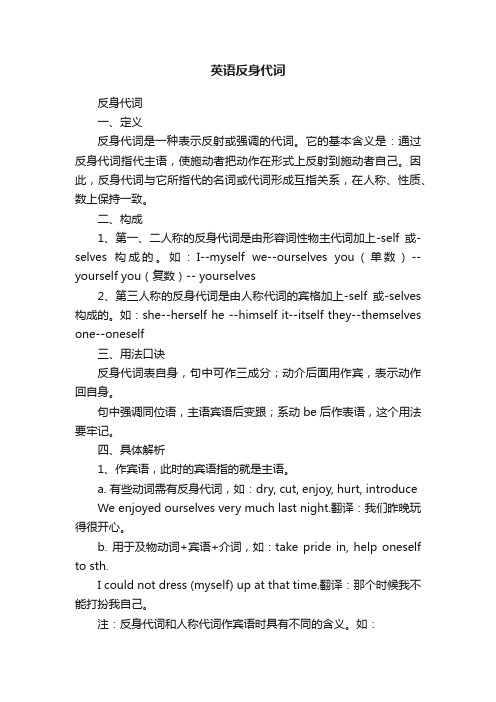
英语反身代词反身代词一、定义反身代词是一种表示反射或强调的代词。
它的基本含义是:通过反身代词指代主语,使施动者把动作在形式上反射到施动者自己。
因此,反身代词与它所指代的名词或代词形成互指关系,在人称、性质、数上保持一致。
二、构成1、第一、二人称的反身代词是由形容词性物主代词加上-self或-selves构成的。
如:I--myself we--ourselves you(单数)-- yourself you(复数)-- yourselves2、第三人称的反身代词是由人称代词的宾格加上-self或-selves 构成的。
如:she--herself he --himself it--itself they--themselves one--oneself三、用法口诀反身代词表自身,句中可作三成分;动介后面用作宾,表示动作回自身。
句中强调同位语,主语宾语后变跟;系动be后作表语,这个用法要牢记。
四、具体解析1、作宾语,此时的宾语指的就是主语。
a. 有些动词需有反身代词,如:dry, cut, enjoy, hurt, introduceWe enjoyed ourselves very much last night.翻译:我们昨晚玩得很开心。
b. 用于及物动词+宾语+介词,如:take pride in, help oneself to sth.I could not dress (myself) up at that time.翻译:那个时候我不能打扮我自己。
注:反身代词和人称代词作宾语时具有不同的含义。
如:He saw himself in the mirror.翻译:他在镜子里看见了他自己。
(himself 和he 为同一人)He saw him in the mirror.翻译:他在镜子里看见了他。
(him 显然指另外一人)2、作表语,此时的表语指的就是主语:I am not myself today.翻译:我今天不舒服。
- 1、下载文档前请自行甄别文档内容的完整性,平台不提供额外的编辑、内容补充、找答案等附加服务。
- 2、"仅部分预览"的文档,不可在线预览部分如存在完整性等问题,可反馈申请退款(可完整预览的文档不适用该条件!)。
- 3、如文档侵犯您的权益,请联系客服反馈,我们会尽快为您处理(人工客服工作时间:9:00-18:30)。
C. my
D. myself
【温馨提醒】
• 1 反身代词不能单独做主语, 但可以做主语的同位语,起强 调作用。
如:我自己能完成作业。
(误)Myself can finish my homework.. (正) I myself can finish my homework. /
I can finish my homework myself.
9. Xiao Hui, can you introduce _________ to us ? 10. Bill wants to teach_________ French from now on.
1. Those girls enjoyed ____ in the party last night. A. them B. they C. themselves D. herself
人称代词 I
you
主格
反身代词 myself yourself
he
himself
she herself
it itself
•第三人称的反身代词由代词宾格加-self构成 总结规律:单数的反身代词都以-self结尾
复数的反身代词有几个,都以什么结尾?
复数的反身代词有几个,都以什么
结尾?
人称代词
we
you
hers C. hers, herself D. her, herself
• 7. Liu Hulan’s death was great. She thought more of others than ______. A. her B. she C. hers D. herself
• 8. Luckily, he didn’t hurt ____ terribly yesterday. A. him B. themselves C. himself D. they
• 9. I can’t mend my shoe _____. Can you mend it for _____?
• A. myself, me B. myself, I C. me, I D. I, me
• 10. I like watching ____ in the mirror.
A. me B. I
2 反身代词表示“某人自己”,不能表示 “某人的东西”,因为它没有所有格的形 式。表达“某人自己的(东西)”时,须 要用one’s own.
如:我用我自己的蜡笔画画。 (误)I’m drawing with myself crayons.
(正) I’m drawing with my own crayons
teach oneself sth./ learn sth. by oneself自学 enjoy oneself玩得高兴,过得愉快 help oneself to sth请自用……(随便吃/喝 些……). Say to oneself自言自语
think to oneself(暗想) all by oneself 独自
they
主格
反身代词 ourselves yourselves themselves
总结规律:复数的反身代词有3个,都以-selves结尾
【用法展现】
1、 可用作宾语,反身代词所指的是宾语和主 语表示同一个或同一些的人或事物。 如:He blames himself for the mistakes. 他因犯错而责备自己。( himself 作宾语)
We/You/They are students. 人称代词宾格作宾语,表示动作行为的对象。
Give it to me. Let’s go (let’s =let us)
二、物主代词
表示所有关系的代词叫做物主代词,也可叫做代词所有格。物主代词分形容词性
物主代词和名词性物主代词二种
数 人称 类别
第一 人称
5 Tim,don’t hurt/with that knife.
Tim,don’t hurt yourself with that knife
6.the bird/built /a nest
The bird built itself a nest
. . . . .
.
趁热打铁
我们刚刚看完反身代词的用法show,现在来这里练练身手吧!
All of you,please make yourselves at home
3 the children/can/look after
The children can look after themselves
4 I/ going to the teach/French
I am going to the teach myself French
5. Help __________to some beef, boys.
6. Jenny enjoyed_________ in the park yesterday afternoon.
7. We can finish our homework by_________ .
8. The blind girl lost_________ in the beautiful music.
与by搭配 当反身代词与by搭配时,意为:单独地,没有 人帮助的。 例如: (1)We must finish it all by ourselves.(我们必 须全靠自己去完成。) (2)He can swim all by himself.(他能独自一个人游泳。
• 4 用在某些固定短语当中。
如look after oneself / take care of oneself 照顾自己
单数
第二 人称
第三 人称
第一 人称
复数
第二 人 称
第三 人称
形容词性物 主代词
my
your his her its our your
their
名词性物主 代词
mine
yours
his
hers
its
ours yours
theirs
汉语
我的
你的
他的
她的
它的
我们 的
他(她、 你们 它)
的们 的
形容词性物主代词: (my/your/his/her/its/our/their)+名词
• hurt oneself摔伤自己 say to oneself自言 自语
• ose oneself in 沉浸于,陶醉于……之中 • leave sb. by oneself把某人单独留下 • buy oneself sth.给自己买……东西 • introduce oneself 介绍……自己 • enjoy oneself 过得很快活
而名词性物主代词则相单于: 形容词性物主代词+名词,故其后不必加名词。
什么是反身代词?
• 反身代词又称为自身代词,表示某人 自己的代词,它表示一个动作行为反 射到行为执行者本身或强调自己,它 有人称或数的变化。它还可以在句中 起到强调的作用,用以加强语气。
【反身代词有多少个?】
• 英语中共有八个反身代词,在使用时应注意 和它所指的相应的对象在人称、性别、数上 保持一致。其基本形式如下表所示:
•掌握反身代词的用法了吗?请到 “练练吧”中的“反身代词练习”中 一试身手吧!
Grammar A Reflexive pronouns 用所给的词及反身代词造句
1 we enjoyed/at /beach today
We enjoyed ourselves at the beach today
2 all of you,please make/at home
• 5. The father will make ____ a bike ____. A. her, himself B. she,
himself C. her, herself D. she, herself
• 6. The scarf is ____, she made it_____. A. herself, her B. herself,
• 2. Help ____ to some fish, children. A. yourself B. your C. yours D. yourselves
• 3. The film ____ is very fun. A. it’s B. itself C. it D. its
• 4. –Who teaches ____ math? –I teach ______. A. your, my self B. you, myself C. you, me D. you, herself
• 如: She isn’t quite herself today. 她今天 有点不舒服。
• 3 可用作主语或宾语的同位语,常用来加强 语气,表示”本人”或”亲自”。
如:She herself will fly to London tomorrow. 明天她自己将要坐飞机去伦敦。
I met the writer himself last week. 我上周见到 了那位作家本人。
如:She made herself a cup of tea. 她给她自己泡了杯茶。( herself 作宾语)
We should not think only of ourselves 我们不应该只想着自己。(ourselves作宾语)
• 2 可用作表语,指的是表语和主语表示同一 个或同一些人或事物。
一、人称代词 表示“我”、“你”、“他”、“她”、“它”、“我们”、“你们”、“他们”
的词,叫做人称代词
人称代词有人称、数和格的变化,见下表:
人称
